Connect With Us
Blog
Items filtered by date: December 2023
Facts About Foot and Ankle Sports Injuries
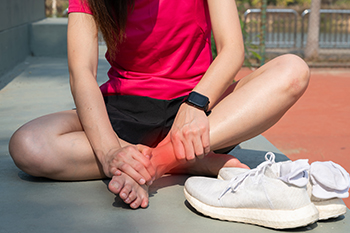
Sports enthusiasts, whether seasoned athletes or weekend warriors, often face the risk of foot and ankle injuries. These injuries are broadly categorized into acute and chronic, each with its unique characteristics. Acute injuries strike suddenly, resulting from falls, blows, or joint twists. Sprained ankles and dislocations are common examples. Conversely, chronic injuries develop gradually due to overuse. Conditions like foot or heel stress fractures fall into this category, often arising from repetitive strain on specific body areas. Several risk factors contribute to these injuries, including incorrect exercise techniques, overtraining, and sudden intensity changes. Running or jumping on hard surfaces, inadequate shoe support, and improper equipment use can also play a role. Further, prior injuries, specifically biomechanical features such as flat feet or bunions can increase the risk of injury. In addition, factors like age, sex, and the nature of physical activity determine one's susceptibility to specific injuries. For help with any sports related foot or ankle injuries, it is suggested that you schedule an appointment with a podiatrist for an exam and treatment options.
Ankle and foot injuries are common among athletes and in many sports. They can be caused by several problems and may be potentially serious. If you are feeling pain or think you were injured in a sporting event or when exercising, consult with Vivian C. Iwu, DPM from Choice Podiatry Center. Our doctor will assess your condition and provide you with quality foot and ankle treatment.
Common Injuries
The most common injuries that occur in sporting activities include:
- Achilles Tendonitis
- Achilles Tendon Rupture
- Ankle Sprains
- Broken Foot
- Plantar Fasciitis
- Stress Fractures
- Turf Toe
Symptoms
Symptoms vary depending upon the injury and in some cases, there may be no symptoms at all. However, in most cases, some form of symptom is experienced. Pain, aching, burning, bruising, tenderness, tightness or stiffness, sensation loss, difficulty moving, and swelling are the most common symptoms.
Treatment
Just as symptoms vary depending upon the injury, so do treatment options. A common treatment method is known as the RICE method. This method involves rest, applying ice, compression and elevating the afflicted foot or ankle. If the injury appears to be more serious, surgery might be required, such as arthroscopic or reconstructive surgery. Lastly, rehabilitation or therapy might be needed to gain full functionality in the afflicted area. Any discomfort experienced by an athlete must be evaluated by a licensed, reputable medical professional.
If you have any questions, please feel free to contact our office located in Marietta, GA . We offer the newest diagnostic and treatment technologies for all your foot care needs.
Types of Ingrown Toenails
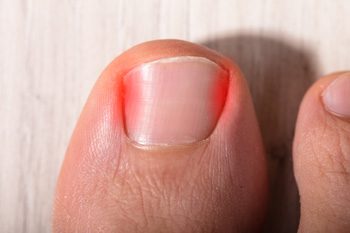
Ingrown toenails, a common foot ailment responsible for approximately 20 percent of podiatric visits, can be attributed to a variety of causes. Among these, improper nail trimming plays a significant role, as cutting nails too short or rounding them incorrectly encourages ingrowth. Wearing tight shoes or high heels that exert pressure on the toes is another prevalent cause. Trauma to the toe, such as injuries, can also contribute to the formation of an ingrown toenail. Three main types of ingrown toenails are categorized by their location on the toe. The lateral ingrown toenail, occurring most frequently, involves the side of the nail edge growing into the skin at the sides of the toe. A distal ingrown toenail can occur when the nail edge grows or curls into the skin at the end of the toe, where the top of the nail meets the skin. Proximal ingrown toenails happen when the nail grows into the skin at the base of the toe, near the cuticle area. This type is characterized by new toenail growth pushing the old nail upwards, causing it to become thick and embedded. Avoiding excessive shortcuts and wearing well-fitted footwear can significantly diminish the risk of ingrown toenails. In instances of persistent discomfort or suspected ingrown toenails, seeking professional advice from a podiatrist is suggested. Podiatrists possess the expertise to accurately diagnose the issue, determine the severity and type of ingrown toenail, and suggest suitable treatment options.
Ingrown toenails may initially present themselves as a minor discomfort, but they may progress into an infection in the skin without proper treatment. For more information about ingrown toenails, contact Vivian C. Iwu, DPM of Choice Podiatry Center. Our doctor can provide the care you need to keep you pain-free and on your feet.
Ingrown Toenails
Ingrown toenails are caused when the corner or side of a toenail grows into the soft flesh surrounding it. They often result in redness, swelling, pain, and in some cases, infection. This condition typically affects the big toe and may recur if it is not treated properly.
Causes
- Improper toenail trimming
- Genetics
- Improper shoe fitting
- Injury from pedicures or nail picking
- Abnormal gait
- Poor hygiene
You are more likely to develop an ingrown toenail if you are obese, have diabetes, arthritis, or have any fungal infection in your nails. Additionally, people who have foot or toe deformities are at a higher risk of developing an ingrown toenail.
Symptoms
Some symptoms of ingrown toenails are redness, swelling, and pain. In rare cases, there may be a yellowish drainage coming from the nail.
Treatment
Ignoring an ingrown toenail can have serious complications. Infections of the nail border can progress to a deeper soft-tissue infection, which can then turn into a bone infection. You should always speak with your podiatrist if you suspect you have an ingrown toenail, especially if you have diabetes or poor circulation.
If you have any questions, please feel free to contact our office located in Marietta, GA . We offer the newest diagnostic and treatment technologies for all your foot care needs.
Custom Orthotics For Ankle Stability
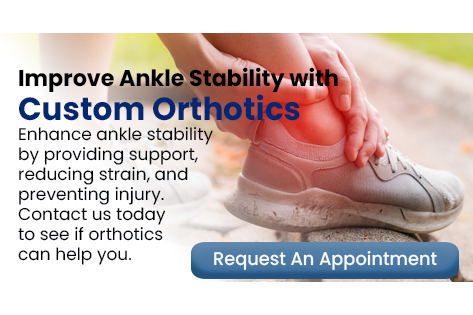
Step with assurance, thanks to enhanced ankle stability from orthotics! If you're active and on the move, Custom Orthotics are your ally for stronger, steadier ankles. They align your foot and ankle, reducing the risk of sprains and offering solid support for every stride. Don’t let instability hold you back. Try Custom Orthotics from our office, and discover unshakable confidence in every step!
Attending to Children’s Foot Health
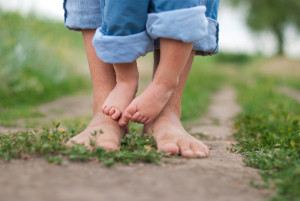
Caring for a child's feet is essential for their overall growth, as their feet develop significantly in early years. To ensure healthy foot development, it is important to let children move their feet freely, without restrictive clothing or bedding. Regular cleaning and drying of the feet, especially between the toes, helps prevent infections. Parents should be vigilant for any signs of cuts, sores, swelling, warts, or ingrown toenails. Barefoot walking is beneficial for children learning to crawl and walk, aiding natural foot and toe development. However, in cold weather, appropriate footwear such as socks or booties is necessary. Since children's feet grow rapidly, regularly checking the fit of socks and shoes is vital to avoid discomfort. When choosing shoes, ensure they fit well and allow for movement and growth. Synthetic shoes should be avoided in favor of breathable, natural materials. Parents should watch for any foot problems or changes in walking patterns and if concerned, it is suggested that they schedule an appointment with a podiatrist for a thorough examination of their child’s feet and treatment if necessary.
The health of a child’s feet is vital to their overall well-being. If you have any questions regarding foot health, contact Vivian C. Iwu, DPM of Choice Podiatry Center. Our doctor can provide the care you need to keep you pain-free and on your feet.
Tips for Keeping Children's Feet Healthy
- Make sure their shoes fit properly
- Look for any signs of in-toeing or out-toeing
- Check to see if they have Clubfoot (condition that affects your child’s foot and ankle, twisting the heel and toes inward) which is one of the most common nonmajor birth defects.
- Lightly cover your baby’s feet (Tight covers may keep your baby from moving their feet freely, and could prevent normal development)
- Allow your toddler to go shoeless (Shoes can be restricting for a young child’s foot)
- Cut toenails straight across to avoid ingrown toenails
- Keep your child’s foot clean and dry
- Cover cuts and scrapes. Wash any scratches with soap and water and cover them with a bandage until they’ve healed.
If you have any questions, please feel free to contact our office located in Marietta, GA . We offer the newest diagnostic and treatment technologies for all your foot care needs.
Swollen Ankles From Flying
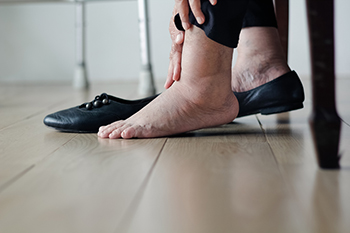
Swollen ankles from flying, a condition known as edema, often occurs during long flights. This happens due to a combination of factors such as prolonged immobility, changes in cabin pressure, and dehydration, all of which can lead to fluid retention in the lower limbs. When seated for extended periods of time, gravity causes fluid to pool in the feet and ankles, leading to swelling. The reduced cabin pressure in airplanes can also contribute to fluid accumulation in the body tissues. Additionally, the air inside the cabin is quite dry, and if an individual does not drink enough water, it can lead to dehydration, further exacerbating the swelling. To alleviate this issue, it is advisable to move around the cabin and perform simple leg and foot exercises while seated. Additionally, it is beneficial to wear loose clothing and maintain hydration by drinking plenty of water. Compression stockings can also be helpful in preventing swelling by promoting better circulation in the legs. If you are planning on taking a long flight, it is suggested that you make an appointment with a podiatrist for more personalized advice, particularly if you have underlying health conditions.
Swollen feet can be a sign of an underlying condition. If you have any concerns, contact Vivian C. Iwu, DPM of Choice Podiatry Center. Our doctor can provide the care you need to keep you pain-free and on your feet.
Swollen feet are a common ailment among pregnant women and people who stand or sit for extended periods. Aging may increase the possibility of swollen feet and patients who are obese often notice when their feet are swelling too. There may be medical reasons why swollen feet occur:
- Phlebitis - A condition that causes the veins to become inflamed and can also cause leg pain.
- Liver disease - This may lead to low blood levels of albumin which is a protein. This can cause fluid in the blood to pass into the tissues and several areas of the body can become swollen.
- Heart failure - When the heart doesn’t pump properly the blood that is normally pumped back to the heart can pool in the veins of the legs causing swollen feet.
- Kidney disease - One of the main functions of the kidneys is releasing excess fluid in the body. This type of condition can make it difficult for the kidneys to function properly, and as a result the feet may become swollen.
- Deep-vein thrombosis (DVT)- This is a serious condition where blood clots form in the veins of the legs. They can block the return of blood from the legs to the heart which may cause the feet to swell. It is important to be treated by a podiatrist if this condition is present.
Swollen feet can also be caused by bone and tendon conditions, including fractures, arthritis, and tendinitis. Additionally, there may be skin and toenail conditions and an infection may cause the feet to swell. Patients who take medicine to treat high blood pressure may be prone to getting swollen feet.
Many patients elevate their feet to help relieve the swelling and this is generally a temporary remedy. When a podiatrist is consulted the reason behind the swelling can be uncovered and subsequently treated.
If you have any questions please feel free to contact our office located in Marietta, GA . We offer the newest diagnostic tools and technology to treat your foot and ankle needs.
Types of Custom Orthotics
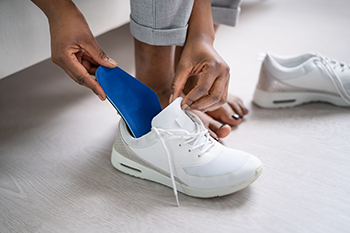
Custom orthotics are specialized medical devices designed to align your foot and leg, correcting biomechanical issues to enhance well-being. Unlike over-the-counter insoles, custom orthotics are tailored to your unique foot structure and specific medical needs, based on a prescription. They can alleviate pain in various parts of the body, offer personalized arch and heel support, and redistribute foot pressure, thereby preventing issues like bunions and calluses. Two primary types of custom orthotics are functional and accommodative orthotics. Functional orthotics offer alignment and support, particularly benefitting athletes and those with conditions like plantar fasciitis or flat feet. Accommodative orthotics focus on comfort and are ideal for those with conditions diabetes or arthritis that can alter foot structure. The process of getting custom orthotics involves a comprehensive biomechanical assessment and gait analysis, followed by impressions of the feet. These guide the orthotic design, ensuring optimal function and fit. Children with flat feet or walking issues may also benefit from custom orthotics to support healthy development. If you would like to learn more about whether custom orthotics would benefit you or other family members, it is suggested that you make an appointment with a podiatrist for a comprehensive evaluation and discussion.
The benefits of custom orthotics are far-reaching and can make a significant impact on your daily life. Whether you are an athlete looking to enhance your performance, a healthcare worker on your feet every day, someone who experiences chronic foot pain, or someone who wants to improve their overall comfort and well-being, custom orthotics can be a game changer.
Custom orthotics provide support, stability, and relief for a variety of foot conditions ranging from flat feet to heel pain. They can even help prevent injuries and address more severe foot concerns, such as plantar fasciitis and diabetic foot issues.
Contact Vivian C. Iwu, DPM at Choice Podiatry Center to create tailored orthotics for you and enjoy a higher quality of life, reduced pain, and increased mobility. With the right orthotics, you can continue doing the things you love, whether it’s running, dancing, or simply walking comfortably without discomfort.
If you are suffering from foot discomfort or have concerns about your foot health, do not hesitate to contact Vivian C. Iwu, DPM at Choice Podiatry Center to explore the benefits of orthotics for you. Your feet are the foundation of your body and investing in their well-being can lead to a happier, healthier, and more active lifestyle. Your feet will thank you!
If you have any questions please contact our office located in Marietta, GA . We offer the newest diagnostic and treatment technologies for all your foot and ankle needs.

